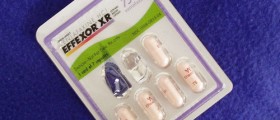
Tricyclicantidepressants (TCA) and selective serotonin reuptake inhibitors (SSRIs) areboth groups of medications used for the treatment of clinical depression. TCAare older drugs and SSRIs have taken over, since they are more easily toleratedand safer when overdosed. Main differences are noticed in mechanism of actionand side effects these drugs cause.
These drugs aresimilarly efficient when it comes to the treatment of depressive disorders.About 60% of all patients treated for major depression respond to the treatmentto either of the drugs, and both medications are proven to cause about 30%higher response than placebo.
TCA and SSRI -Mechanism of Action
Scientistdiscovered that the brain of the person suffering from depression lacks certainsubstances (neurotransmitters). Because of that fact, the treatment fordepression is focused on elevation and prolonged effects of theneurotransmitters in the brain, such as serotonin and norepinephrine.
TCAs work byslowing the reabsorption of the serotonin and norepinephrine. These drugs alsoaffect some other receptors, like alpha1 adrenergic, histaminic and cholinergicreceptors and these effects are responsible for many unwanted side effects.
On the otherhand, SSRIs are strong inhibitors of the serotonin reuptake and work little oninhibition of norepinephrine. Since these drugs are more selective than TCAs,there is also a lower incidence of side effects.
Adverse Effects ofTCAs and SSRIs
As we alreadystated, there are much more side effects asociated with tricyclicantidepressants than with selective serotonin reuptake inhibitors.
TCAs affectcholinergic receptors and thus cause antiholinergic effects. Thes einclude: sedation,dry mouth, constipation, retention of urine, diziness and vision problems. Otherproblems that may arise in patients using TCAs are: weight gain, orthostatichypotension (the person may feel dizzy when changing posture rapidly) andcardiotoxicity, which may be present even in therapeutic doses of the presribeddrug. Older patients may experience an increased risk of undetected cardiac function problems, and TCAs may not be so useful in these patients. Sedationmay also be an important issue, disabling people in performing normal everyday activities in some cases.
SSRIs are not knownto cause sedation, antichlinergic effects, otrhostatic hypotension or toxiceffects to the human heart. Patients using SSRIs may complain about nausea,diarrhea, headaches, sleeping problems, agitation, tremor or dizziness. Thesedrugs also affect the sexual function of the treated patients. Most of the sideeffects caused by SSRIs subside after some time.
AntidepressantOverdose
Patients whooverdosed TCAs may experience problems in the functioning of the brain and theheart, such as rapid heartbeat agitation, flushed face, confusion, seizuresand cardiorespiratory collapse. This condition may be lethal and requiresurgent medical assistance.
SSRIs overdosedoesn’t affect the heart and doesn’t cause seizures, coma or some other severemedical consequences.
- pubmed.ncbi.nlm.nih.gov/9394870/
- cdn.who.int/media/docs/default-source/mental-health/mhgap/depression/antidepressants-(tricyclic-antidepressants-and-selective-serotonin-reuptake-inhibitors)-in-treatment-of-adults-with-depression.pdf?sfvrsn=5c43fa18_2
- Photo courtesy of Amanda Hatfield by Flickr: www.flickr.com/photos/21144640@N00/2270599016






_f_280x120.jpg)


_f_280x120.jpg)






-Uses%2C-Side-Effects-And-Risks_f_280x120.jpg)
Your thoughts on this
Loading...